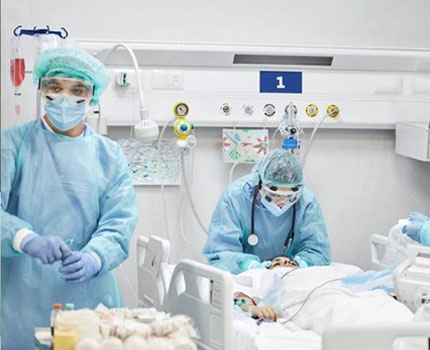Emergency Department Care
Ours is the only nationally verified Level I Trauma Center in Greater Kansas City. As a result, our nurses work in an unpredictable, fast-paced environment, treating more than 50,000 patients per year. In our state-of-the-art facility, we treat patients who have the most serious injuries and illnesses. The department has added 14 beds to better meet demand and provide efficiency – with plans underway to expand it further.
Our Clinical Decision Unit (CDU) within the Emergency Department is a telemetry-monitored, 7-bed, 24-hour observation unit. The CDU provides care for patients whose needs can most often be met within 24 hours. A CDU patient receives monitoring, diagnostic testing, therapy and assessment of symptoms to determine whether they require further treatment as an inpatient or can be safely discharged.
Inpatient Burn Unit
These nurses work with an experienced multidisciplinary team using the latest diagnostic and therapeutic techniques to help patients heal from burns, complex skin disorders, slow-to-heal wounds, and reconstructive surgeries. Our Burnett Burn Center is an adult- and pediatric-verified burn center that provides acute and intensive inpatient care to those who need specialized treatment and rehab interventions. The center features two hydrotherapy bays, an operating room suite, a nutrition center and a physical therapy gym. We closely collaborate with the outpatient Burn and Wound Care Clinic to provide ongoing specialized wound care in the outpatient setting, which may include hyperbaric oxygen therapy to enhance healing.
Surgical Intensive Care
Our SICU is a 20-bed unit that provides fast-paced care to high-acuity patients. Our interdisciplinary team provides specialized surgical services in eight areas, resulting in a complex patient population with many comorbidities. The SICU is also the trauma unit, helping maintain the hospital’s Level I trauma status. Trauma patients often have multisystem injuries ranging from orthopedic, vascular and neurological. Nurses are highly involved in bedside procedures and directing the plan of care for post-operative and trauma patients. The SICU environment promotes teamwork and challenges nurses to maintain advanced critical thinking and problem-solving skills.
Medical-Surgical Intensive Care
This unit provides comprehensive care for critically ill medical and surgical patients who have complex medical conditions that require the highest level of expert care. Nurses collaborate with a multidisciplinary team comprised of RNs, critical care physicians, respiratory therapists, pharmacists, physical therapists and occupational therapists. The unit treats such conditions as pulmonary disease, gastrointestinal bleeding, cancer and sepsis, and the team treats surgical patients who require intensive monitoring during their immediate post-operative phase. It is a fast-paced environment that requires advanced critical-thinking and excellent communication and problem-solving skills.
Medical Transplant Intensive Care
The Medical Transplant ICU (MTICU) provides critical care for complex medical and surgical patients. Nurses provide intensive care for patients before or after they receive liver, kidney or pancreas transplants. Having an ICU dedicated to transplant patients allows for continuity of care and optimizes standards of care, resulting in improved outcomes. Nurses also provide care for complex patients with medical conditions such as acute liver failure, respiratory failure, severe sepsis, and pulmonary hypertension, as well as post-surgical patients following hepatobiliary surgeries. Nurses are trained in advanced therapies such as continuous renal replacement therapy and molecular adsorbent recirculating system. Here, nurses utilize expert clinical skills, critical thinking, and teamwork to provide exceptional care to critically ill patients.
Medical Intensive Care
The Medical Intensive Care Unit (MICU) serves the critical care adult population under the Pulmonary Critical Care services team. In this 14-bed unit, our staff provides care for patients with complex medical conditions and multisystem disease processes such as liver failure, severe sepsis and septic shock, renal failure, pulmonary hypertension (PH), acute or chronic respiratory failures/failure-to-wean, diabetic ketoacidosis (DKA), drug overdose/toxicity, hematology oncology, critical illness for obstetrics patients (OB) and cystic fibrosis (CF). The MICU is a closed unit in which only Pulmonary Critical Care providers have admitting privileges to the unit and manage patient care with consulting services. We also admit patients via the Rapid Response Team (RRT), the Code Blue Team and the transfer center. Patients transfer in when the care needed exceeds community hospital resources or when the patient needs care that we specialize in.
Neuroscience and ENT Intensive Care
Patients who are critically ill with neurological, neurosurgical, and head and neck (ENT) surgery receive expert care from our ICU team. Patients in this unit have conditions such as acute ischemic and hemorrhagic stroke, brain tumors, intracranial aneurysms, neuroinfectious diseases, neuromuscular diseases, status epilepticus, and head and neck cancers. Because we have a Comprehensive Stroke Center certified by The Joint Commission, our physicians, nurses and other specialists are trained to recognize and treat stroke symptoms and provide immediate help – improving outcomes for stroke patients. Nurses manage patients with external ventricular drains (EVD), ICP monitoring, invasive lines and drains, and routinely recover patients from our operating rooms that need our expert neurology and ENT care. Nurses may also be trained to be part of the Acute Stroke Response Team (ASRT) with additional training once they are an established team member.
Hematology/ Oncology ICU
New in December 2021, this leading-edge, 16-bed ICU serves patients who have complex medical conditions, focusing on hematological and oncological disease processes. The unit takes part in rapid response and code blue services throughout Cambridge Tower A.
Cardiothoracic Surgery Intensive Care
The CTSICU is a 16-bed ICU that supports the acute surgery needs of the cardiac, thoracic and advanced heart failure patient. Nurses on this unit help with the immediate post-operative care of coronary artery bypass, valve replacement, left ventricular assist device (LVAD) and heart transplant patients. The unit is known for its high acuity and the advanced patient care therapies, such as continuous renal replacement therapy (CRRT), intra-aortic balloon pump-IABP, LVAD, ProTek Duo and the extracorporeal membrane oxygenation (ECMO), which our nurses are trained to support.
Nurses enjoy the acuity and complexity of our patient population. Patients often have one or more complex life-sustaining devices supporting their treatment. CTSICU nurses are the only trained RNs for many of these devices. The primary reason our patients admit to the CTSICU is for their surgical intervention. The nurses are competent to not only care for the acute but also the chronic comorbidities each of our patients admit with.
These are the sickest patients in the hospital (region) when you compare the CMI. On average, the unit cares for 2–3x that of any other ICU at the health system. Our length of stay for the typical surgical patient is 1–2 days in the ICU. Nurses get to experience seeing their patients’ condition improve post-surgical intervention. This differs from other areas with high length of stay and patients dealing with chronic conditions. Overall, the nursing culture is one of teamwork, high staff satisfaction and historically low turnover.
Cardiac Intensive Care
The Cardiac ICU (CICU) prides itself in using the latest critical care technology and evidenced-based practices in caring for a wide variety of cardiovascular conditions. Patients who are hospitalized for acute myocardial infarction, chronic heart failure, cardiogenic shock, congenital disorders, complex arrhythmia management and post-cardiac arrest care receive quality care on this unit. Nurses also provide comprehensive cardiovascular care for patients requiring advanced heart failure therapies such as ventricular assist devices and pre-heart transplant treatments. This unit supports a collaborative approach with their interdisciplinary team of physicians, advanced practice providers, pharmacists and therapists. Teamwork is highly valued and supported in the CICU.
View Jobs





